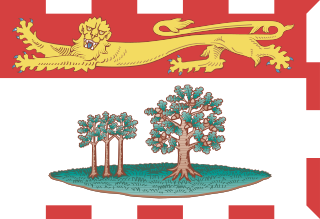
Prince Edward Island is an island province of Canada. While it is the smallest province in terms of land area and population, it is the most densely populated. The island has several nicknames: "Garden of the Gulf", "Birthplace of Confederation" and "Cradle of Confederation". Its capital and largest city is Charlottetown. It is one of the three Maritime provinces and one of the four Atlantic provinces.
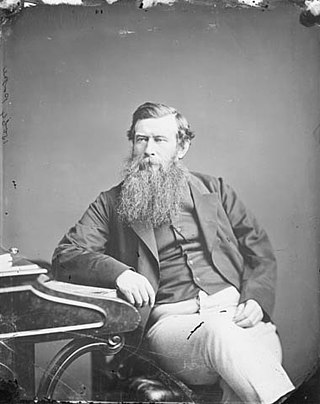
William Henry Pope was a Canadian lawyer, politician, journalist, judge and one of the Fathers of Confederation.
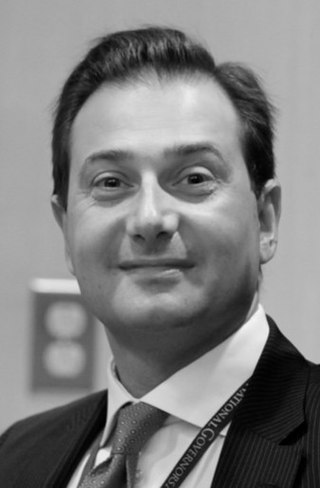
The 2003 Prince Edward Island general election was held on September 29, 2003 to elect the 27 members of the Legislative Assembly of Prince Edward Island. The election was called on September 2 by Premier Pat Binns, who enjoyed a high level of popularity among voters.

John Hamilton Gray was Premier of Prince Edward Island from 1863 – 1865 and one of the Fathers of Confederation.

Edward Palmer was a Canadian politician born at Charlottetown, Prince Edward Island and resided in Prince Edward Island until his death. He is considered one of the Fathers of Canadian Confederation, despite his opposition to Confederation, as he was a delegate to both the Charlottetown and Quebec Conferences.

The Prince Edward Island Liberal Party is a political party in the province of Prince Edward Island, Canada. The PEI Liberals are affiliated with the federal Liberal Party of Canada.

The Progressive Conservative Party of Prince Edward Island is one of three major political parties on Prince Edward Island. The party and its rival, the Liberals, have alternated in power since responsible government was granted in 1851.
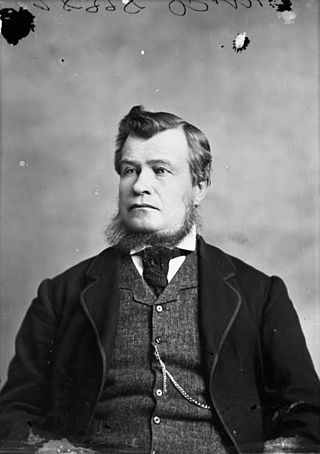
James Colledge Pope, was a land proprietor and politician on Prince Edward Island (PEI), Canada. He served as premier of the colony from 1865 to 1867, and from 1870 to 1873. He was premier of PEI in 1873 when the island joined Canadian confederation.

Neil McLeod was a Prince Edward Island lawyer, judge, politician, the fifth premier, and Leader of the Opposition during the amalgamation of the Prince Edward Island legislature. He was born at Uigg on the island to Roderick McLeod and Flora McDonald, Baptist immigrants from the Isle of Skye in Scotland. He was educated at the Uigg Grammar School and in Wolfville, Nova Scotia, articled in law at Charlottetown and was called to the bar in 1873. Four years later, his marriage to the beloved Isabella Jane Adelia Hayden, the Methodist granddaughter to Irish Roman Catholic immigrant and merchant John Roach Bourke, furthered Gaelic intersections among Islander cultural enclaves. McLeod was the child of immigrants from the Isle of Skye. Between 1886-1893, transcriptions by parliamentary reporters and petition amanuenses identified him as both "Neil McLeod" and "Neil MacLeod." Reporters included his 5th Queens district next to his name in order to distinguish him from Angus MacLeod. Charlottetown dailies that reproduced passages from the transcriptions also replicated the spelling variation during this period. Historians continue to research his positions on the 1882 replacement of French-language texts with bilingual readers for French Acadians, late nineteenth-century prohibitions on Canadian Gaelic, and corporal punishment in Prince Edward Island schools. During this period, McLeod practiced law with partner Edward Jarvis Hodgson before joining the McLeod, Morson, and McQuarrie law firm. He also served as Commissioner for the Poor House and as a "trustee" to the public Prince Edward Island Hospital for the Insane, which replaced the Lunatic Asylum following a Grand Jury inquest. In 2019, mental health officer and occupational therapist Tina Pranger examined the presents and pasts of the Hillsborough Hospital, providing a summation of previous assessments of the inquest by historians and curators.

The 1966 Prince Edward Island general election was held on May 30, 1966.
The politics of Prince Edward Island are centred on a provincial government resembling that of the other Canadian provinces. The capital of the province of Prince Edward Island is Charlottetown, where the lieutenant governor and the premier reside, and where the provincial legislature and cabinet are located.
Belfast is a rural municipality in Prince Edward Island, Canada. It is located in southeastern Queens County in the townships of Lot 57 and Lot 58.

Charlottetown Rural High School (CRHS), known colloquially as "The Rural", is a Canadian secondary school in Charlottetown, Prince Edward Island. Students who attend the school come from the north and east parts of Queens County, including the City of Charlottetown and the town of Stratford.
Richard Earle Brown is a Canadian politician, who was elected to the Legislative Assembly of Prince Edward Island in the 2007 provincial election. He represented the electoral district of Charlottetown-Victoria Park as a member of the Liberal Party. His brother Philip Brown, is the current and 46th Mayor of Charlottetown.
John Paul Connolly is a Canadian former educator and politician.
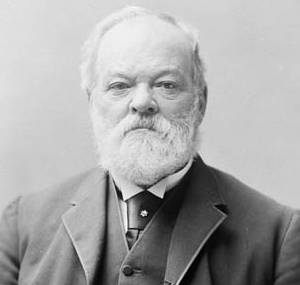
Stanislaus Francis Perry was a Canadian farmer and politician in Prince Edward Island.
Hector Charles McDonald, was a barrister, judge and political figure in Prince Edward Island. He represented 4th Queens in the Legislative Assembly of Prince Edward Island from 1890 to 1899 as a Liberal member.
James H. Cummiskey was a merchant and political figure on Prince Edward Island. He represented 3rd Queens in the Legislative Assembly of Prince Edward Island from 1891 to 1911 as a Liberal.
Timothy E. Carroll is a Canadian politician and educator. He represented 5th Queens in the Legislative Assembly of Prince Edward Island from 1986 to 1996 as a Liberal.














